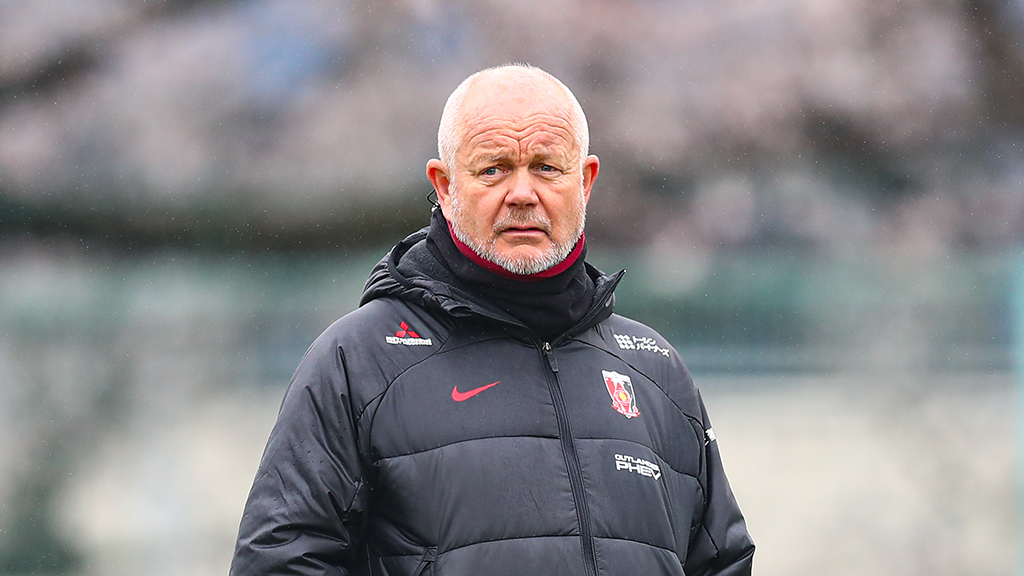NEWS
「まだまだ改善できるし、もっとチャンスをつくれる」ペア マティアス ヘグモ監督(定例会見 4/5)
5日、ペア マティアス ヘグモ監督の記者会見がオンラインで行われ、7日(日)に埼玉スタジアムで行われる明治安田J1リーグ 第7節 サガン鳥栖戦【SPORTS FOR PEACE! DAY】に向けて意気込みを語った。
(連戦の中、FC東京戦はかなり厳しい展開となり、コンディションを回復させることが中心になってくると思うが、鳥栖戦に向けてどのような準備をしていきたいと感じているか?)
「そのためにも昨日、選手たちにはオフを与えました。今日は2つのグループに分け、ゲームで長い時間プレーした選手たちはリカバリー、それ以外の選手たちはスピードのセッションにしました。サッカーの練習をしながらしっかりと強度を上げ、戦術的なことも行いました。午前、午後と2回のミーティングを行い、試合の振り返りと鳥栖に向けての準備も行いました。次の試合に集中するということが、今の我々が一番やらなければいけないことです」
(鳥栖の印象は?)
「プレスの掛け方はFC東京に少し似ていると思います。またGKからつないで組み立てるというやり方がはっきりしています。そのビルドアップの中でGKもたくさん関わっていきます。ポゼッションしたいチームです」
(どのようなところに気を付けたいか?)
「我々は我々の攻撃の向上を目指しています。いつ速攻を仕掛けて進入するのか、そしていつ自分たちがボールを握ってコントロールするのかという判断のところです」
(酒井宏樹選手がFC東京戦の後に足を検査するという話が出ていたが、酒井選手の状況はどうか?)
「試合で少し感じたということで検査をしていますが、まだ結論を出せない状況ではあります。明日の練習で見てみたいと思っています」
(FC東京戦では前半の30分までに4回はゴールに近づき、点を取れていてもおかしくない場面があった。チアゴ サンタナ選手のシュートは何十回に1回というシュートなのでその数には入れていないが、よくおっしゃられている「先に決定的な場面を決められなかった」ということはこの試合にも当てはまってしまうと思う。決定力を上げるためにはどういうアプローチをするべきだと考えているのか?チャンスの質を上げることが必要なのか?選手個々にアプローチして個人のことをやっていくのか?それともそれはプロとして選手が解決することなのか?)
「非常に大事なところの質問だと思います。我々の改善点です。FC東京戦では(伊藤)敦樹が2度ほど相手からボールを奪いそのまま運んで2、3人抜き去るという場面がありました。4対2という場面も一度作っています。その後、裏に抜ける動きとそこにパスを出すタイミングが合えば、より明確な大きなチャンスを作ることができると思います。例えば(湘南)ベルマーレ戦のときの1点目のような形です。そして、いろいろな要素を改善できると思います。フィニッシュのところの個のクオリティもありますが、そこへのパスをどうするかなどの関係性も重要です。もう一つはその判断をキャンセルして別のプレーができるかどうかということもあると思います。FC東京戦は2点目を取っていればまた違った流れになっていたと思いますので、その最後の決定力はやはり上げていかないといけないと思います。」
(マティアス監督にとってサッカーのシステムはどういうものなのか?たとえば、電話番号のようなものだと言った監督もいるし、そこに哲学が表れるものだという人もいる。マティアス監督は4-3-3が多く、時々ダブルボランチにするが、相手に応じて決めたり自分たちのやりたいようにやったりということがあると思うが、どういうものか?)
「言葉というものは非常に大事なものだと思います。お互い言葉を発していて、その中でシンクロしていくと思います。4-3-3は私はフォーメーションと表現します。攻撃では4-3-3、そのまま4-3-3でプレスもかけることができます。ローディフェンスだと4-5-1になったりします。流れの中で呼び方が変わってくると思いますが、原理としては、まず攻撃の原理では後ろからビルドアップをしっかりしていきたい。組み立てるというのはショートパスのことだけではありません、ダイレクトなプレーで背後に出すということもそのプレーの一部だと思っています。
また攻撃の原理的には2対1をつくるというものがあります。それは低い位置でもそうですし、前線でもそうです。我々はハイプレスをかけたいですし、相手を我々のプレスで封じ込めることもしたいと思っています。試合の状況によってはミドルブロックや、ローブロックで守備をすることもあります。そしてその形は相手チームによって、変わってくる部分もあると思いますし、流れの中で変わることもあると思います。そしてボールポゼッション率が70パーセントの試合と50パーセントの試合では、見た目も変わってくると思います。その形が変わったとしても、重要なのはメインの原理を守り、あらゆるフェーズで守ることだと思います。
フォワードへのロングボールを多用すればリスクは軽減すると思います。それでもしっかりとつなぎながらいくというチャレンジを全員でやっているところです。そのために、選手の関係性も含めながら行っています。そして我々の哲学というのは、あらゆる局面でそのゲームをコントロールできるかということがあります」
(フォーメーションは哲学を実現するためのものという受け取り方をすればいいのか?)
「そのように言っても構わないと思います」
(トレーニングキャンプの最終日のサガン鳥栖戦のときに、守備陣の選手が「得点力を上げるためにどれだけ後ろがプッシュアップして攻撃陣をサポートできるか」という話をしていて、ここまで6試合でその確認をしていたが、まだ少し重い印象がある。ビルドアップの際にセンターバックの2人にはどんな役割を求めているのか?)
「ビルドアップではゴールキーパーとセンターバック、そして両サイドバックが中心となります。その近くにアンカーがいて、インサイドハーフのうち1枚が下りてくるという状況もあります。そこでつないでいきますが、状況によっては前線の3人にボールを供給する場面もありますので、前の選手たちもしっかりと準備をしていなければいけません。ディテールの話をすれば、サイドバックは高さを調節して顔を出すということをしなければいけません。また、その中でセンターバックがボールを受けて相手に向かうというプレーができれば、2対1の場面を作ることができます。ラストサードに入ったところでサイドバックのうち1枚が高いポジションまで上がっていきます。センターバックがしっかり押し上げていれば距離感を保つことができ、相手がクリアしたとしてもセカンドボールを拾いやすくすることができます」
(ゴールキーパーに関しては、GKチームを束ねるジョアン ミレッGKコーチとは現状についてどんな話をしているのか?)
「ゴールキーパーも我々のサッカーのやり方で攻撃に参加してもらいたいと思っていますので、いつもそういった話はジョアンともしていますし、ビルドアップでゴールキーパーも中心的な存在です。彼ともよく話していて、全体のトレーニングの中にゴールキーパーがさらに参加してもいいのではないかということを言ったりもしています」
(FC東京戦ではサミュエル グスタフソン選手が包囲され、その周囲や両サイドの大きいスペースを使われていたと解釈したが、1-2になった後にダブルボランチにしたということを現象として説明していただいたが、1-2になる前にそういう状況になっていたときにどのように考えていたのか?また、1点目を取られたときに伊藤選手がボールについていくことができなかった。どうして彼があそこでジョギングのようなプレーになっていたのかが理解できない。肉体的に難しかったのか、システム的には戻ることができなかったのか。取り方によっては怠慢プレーに見えてしまうが、マティアス監督は修正が簡単にできると思うと言っていたが、その理由は?)
「これはポジションへの順応ということもあると思います。ダブルボランチに慣れていた敦樹がこのインサイドハーフでより走るプレーを増やすというところだと思います。沖縄での練習試合で点を取ったときのように、攻撃のときは前に駆け上がってペナルティーエリアに進入するというプレーも増やそうとしています。2週間前の練習試合でも、彼が駆け上がっていって、素晴らしいボールをチアゴ(サンタナ)に送り、チアゴのいいゴールにつながりました。前半で2回駆け上がっていって、後半にもシュートがあったように、いい攻撃の形はできていると思います。このチームには怠けている選手はいないと思います。
どちらかといえば周りをしっかりと観察して、危険な状況を早めに察知するということが必要だと思います。この試合に関しては、相手チームがボールを持っているときに我々は28回プレスを掛けに行きました。そのうち23回ボールを奪取しています。8割近くの場合でボールを奪えているということは悪くないと思います。そのボールを奪いに行くというところで良い形ができていると思います。そして流れの中でインサイドハーフがハイプレスを掛けに行ったときは、アンカーと逆のインサイドハーフが残りますので、そこは2ボランチに近いような形になります。ハイプレスをかけるときは一人ひとりがカバーするスペースは大きくなります。その中でダイナミックに動きながらバランスを取り続けることが必要です」
(伊藤敦樹選手がアタックをすることは悪くなく、彼がいいプレイヤーだということは理解できるが、守備の部分で戻れなかった事実があり、それは改善できるのか?)
「前回の公開練習のときも行っていましたが、その1対1のところはかなり良い練習ができています。システムの話を1日中することもできますが、その最終的な局面は1対1だったりしますので、そこでしっかりと相手に寄せるという守備の良い練習にもなりましたし、攻撃の選手もそこで抜き去るという練習になっています。そのようなところをしっかり練習でやるという文化をつくっていきたいと思っています」
(開幕から失点が多いが、その原因をどう感じているか?守備の改善点や約束事の確認をどう捉えて進めていこうと考えているのか?)
「その質問にはいくつかの答え方があると思いますが、一つは新しいサッカーに今、選手たちが順応するプロセスにあるということです。そこを安定させるということが必要だと思います。また、中心選手がシーズンの当初から何人か怪我などで離脱したり戻ってきたりという状況が続いています。そしてミスも犯しています。それはなくさなければいけません。もちろんチームとしても、より安定した守備ができないといけないと思っています。ですが、先ほども話したように1対1での強さというところも今、上げていこうとしています。
そしてそのコンビネーションだと思いますが、シーズンを通しての1試合の失点の平均を1点以下に抑えられればと思っています。38試合ありますので、35点以下に抑えたいと思っています。この前のホームゲームで相手に与えたチャンスは2つしかなかったと思いますが、それよりさらに守備を安定させたいと思います。選手たちもそこを改善したい、向上したいという気持ちを持っていますので、非常にいいことだと思います」
(大畑歩夢選手がAFC U23アジアカップカタール2024のメンバーに選ばれた。彼を左サイドバックや時にはウイングで起用していると思うが、彼のプレー面の良さは?)
「まずU-23日本代表で日本を代表してプレーできることをうれしく思っています。攻撃で使えるいろいろなスキルを持った攻撃的な選手だと思います。そして彼はサッカーが大好きだということが感じられますので、見ていて非常に良い部分だと思います。スピードもプラスと言えるものを持っています」
(大畑選手の練習への姿勢や人間性をどう感じるか?)
「非常に良いと思います。良い姿勢だと思います。我々はミーティングで自己紹介などを行っていますが、本日は歩夢の番でした。非常に良い自己紹介でした。一緒に仕事ができて良かったと思える選手であり、先ほど言った攻撃のところはさらに伸ばしていきたいですし、守備のペナルティーエリア内での1対1も伸ばしてもらいたいと思っています」
(大畑選手の自己紹介はどんなところが良かったのか?)
「非常にチャーミングな人柄が出ていました。ユーモアなところと真剣な話をうまく織り交ぜていました。そしてこの自己紹介は選手やスタッフが行っていますが、40人くらいを前にして自分の話をするというものですので、多くの人にとっては新しい経験だと思います。コンフォートゾーンから少し外れて、自らを表現するということです。こういう大人数の前で自己評価をするということは、埼玉スタジアムの4万人、5万人の前でプレーするのと同じような状況だと思います。そこでストレスを感じることなく、その状況を好んで、落ち着いて行動することが大事だと思います。レッズでプレーするなら必要である、個々の強さをつくるためでもあります」
(大畑選手は開幕から5試合は途中出場で前節のFC東京戦は先発出場したが、どのようなところが良くなって先発メンバーとして起用したのか?)
「沖縄トレーニングキャンプから今まで、彼は常に成長し続けています。フィジカルも上がっていますし、自信もつけています。攻撃での1対1も非常に良くなっていると思います。彼はラストサードに進入することができる選手です。ビルドアップも得意です。長所も伸びていますし、改善点も力を入れています」
(自己紹介は1巡目が終わったら2巡、3巡と永遠に続くものなのか?)
「残っているのは選手があと2人、スタッフはあと5人くらいです。2周目は詩を読んでもらおうと思っています(笑)」
(どうして詩を読んでもらおうと思っているのか?)
「私は選手たちにチャレンジを与え、コンフォートゾーンから外れていろいろ自制しながら考えて行動してもらうことを望んでいます。ピッチ上のトレーニングも大事ですが、こういった行動もチームビルディングの一環だと思っています。そして記者会見で記者のみなさんにも自己紹介してもらうことを楽しみにしています(笑)。自分の長所を3つと自分が改善したい点3つを紹介してください。日曜日の埼玉スタジアムでの試合後の会見でそれを始めましょう(笑)」
(失点に対して得点やチャンスが少ないという見方もできると思うが、チャンスの数は増えていて、細かいところを見ていくと昨年はあまりなかった味方をフリーにする2対1の関係性などは練習の成果が少しずつ出ていると思う。攻撃における選手の関係性について、指導前から現在までの成長ぶりをどう見ているか?)
「選手の関係性は良くなってきていると思いますが、まだまだ改善できると思っています。もっとチャンスをつくれると思います。特に得点の後、攻撃し続けることが必要だと思います。得点の後、心理的なところから来るものだと思いますが、少し下がってしまって慎重になる姿があると思います。1-0でリードしていれば、相手も攻撃を仕掛けなければいけないので、2点目を取る、次のゴールを決めるチャンスは大きくなっている状況です。今後はそういった部分での改善が見られればと思います。トレーニングでは行っていますし、怪我人もどんどん復帰してくると思いますので、さらに良くなっていくと思います」
(守備については少し心配しているが、攻撃の良いところも同時に見ていきたいと思います)
「どちらもしっかりとトレーニングしていきたいと思っています。それでは、日曜日にお会いできることを楽しみにしています。自己紹介の前にまず、それぞれの仕事をしましょう」
【浦和レッズオフィシャルメディア(URD:OM)】
(連戦の中、FC東京戦はかなり厳しい展開となり、コンディションを回復させることが中心になってくると思うが、鳥栖戦に向けてどのような準備をしていきたいと感じているか?)
「そのためにも昨日、選手たちにはオフを与えました。今日は2つのグループに分け、ゲームで長い時間プレーした選手たちはリカバリー、それ以外の選手たちはスピードのセッションにしました。サッカーの練習をしながらしっかりと強度を上げ、戦術的なことも行いました。午前、午後と2回のミーティングを行い、試合の振り返りと鳥栖に向けての準備も行いました。次の試合に集中するということが、今の我々が一番やらなければいけないことです」
(鳥栖の印象は?)
「プレスの掛け方はFC東京に少し似ていると思います。またGKからつないで組み立てるというやり方がはっきりしています。そのビルドアップの中でGKもたくさん関わっていきます。ポゼッションしたいチームです」
(どのようなところに気を付けたいか?)
「我々は我々の攻撃の向上を目指しています。いつ速攻を仕掛けて進入するのか、そしていつ自分たちがボールを握ってコントロールするのかという判断のところです」
(酒井宏樹選手がFC東京戦の後に足を検査するという話が出ていたが、酒井選手の状況はどうか?)
「試合で少し感じたということで検査をしていますが、まだ結論を出せない状況ではあります。明日の練習で見てみたいと思っています」
(FC東京戦では前半の30分までに4回はゴールに近づき、点を取れていてもおかしくない場面があった。チアゴ サンタナ選手のシュートは何十回に1回というシュートなのでその数には入れていないが、よくおっしゃられている「先に決定的な場面を決められなかった」ということはこの試合にも当てはまってしまうと思う。決定力を上げるためにはどういうアプローチをするべきだと考えているのか?チャンスの質を上げることが必要なのか?選手個々にアプローチして個人のことをやっていくのか?それともそれはプロとして選手が解決することなのか?)
「非常に大事なところの質問だと思います。我々の改善点です。FC東京戦では(伊藤)敦樹が2度ほど相手からボールを奪いそのまま運んで2、3人抜き去るという場面がありました。4対2という場面も一度作っています。その後、裏に抜ける動きとそこにパスを出すタイミングが合えば、より明確な大きなチャンスを作ることができると思います。例えば(湘南)ベルマーレ戦のときの1点目のような形です。そして、いろいろな要素を改善できると思います。フィニッシュのところの個のクオリティもありますが、そこへのパスをどうするかなどの関係性も重要です。もう一つはその判断をキャンセルして別のプレーができるかどうかということもあると思います。FC東京戦は2点目を取っていればまた違った流れになっていたと思いますので、その最後の決定力はやはり上げていかないといけないと思います。」
(マティアス監督にとってサッカーのシステムはどういうものなのか?たとえば、電話番号のようなものだと言った監督もいるし、そこに哲学が表れるものだという人もいる。マティアス監督は4-3-3が多く、時々ダブルボランチにするが、相手に応じて決めたり自分たちのやりたいようにやったりということがあると思うが、どういうものか?)
「言葉というものは非常に大事なものだと思います。お互い言葉を発していて、その中でシンクロしていくと思います。4-3-3は私はフォーメーションと表現します。攻撃では4-3-3、そのまま4-3-3でプレスもかけることができます。ローディフェンスだと4-5-1になったりします。流れの中で呼び方が変わってくると思いますが、原理としては、まず攻撃の原理では後ろからビルドアップをしっかりしていきたい。組み立てるというのはショートパスのことだけではありません、ダイレクトなプレーで背後に出すということもそのプレーの一部だと思っています。
また攻撃の原理的には2対1をつくるというものがあります。それは低い位置でもそうですし、前線でもそうです。我々はハイプレスをかけたいですし、相手を我々のプレスで封じ込めることもしたいと思っています。試合の状況によってはミドルブロックや、ローブロックで守備をすることもあります。そしてその形は相手チームによって、変わってくる部分もあると思いますし、流れの中で変わることもあると思います。そしてボールポゼッション率が70パーセントの試合と50パーセントの試合では、見た目も変わってくると思います。その形が変わったとしても、重要なのはメインの原理を守り、あらゆるフェーズで守ることだと思います。
フォワードへのロングボールを多用すればリスクは軽減すると思います。それでもしっかりとつなぎながらいくというチャレンジを全員でやっているところです。そのために、選手の関係性も含めながら行っています。そして我々の哲学というのは、あらゆる局面でそのゲームをコントロールできるかということがあります」
(フォーメーションは哲学を実現するためのものという受け取り方をすればいいのか?)
「そのように言っても構わないと思います」
(トレーニングキャンプの最終日のサガン鳥栖戦のときに、守備陣の選手が「得点力を上げるためにどれだけ後ろがプッシュアップして攻撃陣をサポートできるか」という話をしていて、ここまで6試合でその確認をしていたが、まだ少し重い印象がある。ビルドアップの際にセンターバックの2人にはどんな役割を求めているのか?)
「ビルドアップではゴールキーパーとセンターバック、そして両サイドバックが中心となります。その近くにアンカーがいて、インサイドハーフのうち1枚が下りてくるという状況もあります。そこでつないでいきますが、状況によっては前線の3人にボールを供給する場面もありますので、前の選手たちもしっかりと準備をしていなければいけません。ディテールの話をすれば、サイドバックは高さを調節して顔を出すということをしなければいけません。また、その中でセンターバックがボールを受けて相手に向かうというプレーができれば、2対1の場面を作ることができます。ラストサードに入ったところでサイドバックのうち1枚が高いポジションまで上がっていきます。センターバックがしっかり押し上げていれば距離感を保つことができ、相手がクリアしたとしてもセカンドボールを拾いやすくすることができます」
(ゴールキーパーに関しては、GKチームを束ねるジョアン ミレッGKコーチとは現状についてどんな話をしているのか?)
「ゴールキーパーも我々のサッカーのやり方で攻撃に参加してもらいたいと思っていますので、いつもそういった話はジョアンともしていますし、ビルドアップでゴールキーパーも中心的な存在です。彼ともよく話していて、全体のトレーニングの中にゴールキーパーがさらに参加してもいいのではないかということを言ったりもしています」
(FC東京戦ではサミュエル グスタフソン選手が包囲され、その周囲や両サイドの大きいスペースを使われていたと解釈したが、1-2になった後にダブルボランチにしたということを現象として説明していただいたが、1-2になる前にそういう状況になっていたときにどのように考えていたのか?また、1点目を取られたときに伊藤選手がボールについていくことができなかった。どうして彼があそこでジョギングのようなプレーになっていたのかが理解できない。肉体的に難しかったのか、システム的には戻ることができなかったのか。取り方によっては怠慢プレーに見えてしまうが、マティアス監督は修正が簡単にできると思うと言っていたが、その理由は?)
「これはポジションへの順応ということもあると思います。ダブルボランチに慣れていた敦樹がこのインサイドハーフでより走るプレーを増やすというところだと思います。沖縄での練習試合で点を取ったときのように、攻撃のときは前に駆け上がってペナルティーエリアに進入するというプレーも増やそうとしています。2週間前の練習試合でも、彼が駆け上がっていって、素晴らしいボールをチアゴ(サンタナ)に送り、チアゴのいいゴールにつながりました。前半で2回駆け上がっていって、後半にもシュートがあったように、いい攻撃の形はできていると思います。このチームには怠けている選手はいないと思います。
どちらかといえば周りをしっかりと観察して、危険な状況を早めに察知するということが必要だと思います。この試合に関しては、相手チームがボールを持っているときに我々は28回プレスを掛けに行きました。そのうち23回ボールを奪取しています。8割近くの場合でボールを奪えているということは悪くないと思います。そのボールを奪いに行くというところで良い形ができていると思います。そして流れの中でインサイドハーフがハイプレスを掛けに行ったときは、アンカーと逆のインサイドハーフが残りますので、そこは2ボランチに近いような形になります。ハイプレスをかけるときは一人ひとりがカバーするスペースは大きくなります。その中でダイナミックに動きながらバランスを取り続けることが必要です」
(伊藤敦樹選手がアタックをすることは悪くなく、彼がいいプレイヤーだということは理解できるが、守備の部分で戻れなかった事実があり、それは改善できるのか?)
「前回の公開練習のときも行っていましたが、その1対1のところはかなり良い練習ができています。システムの話を1日中することもできますが、その最終的な局面は1対1だったりしますので、そこでしっかりと相手に寄せるという守備の良い練習にもなりましたし、攻撃の選手もそこで抜き去るという練習になっています。そのようなところをしっかり練習でやるという文化をつくっていきたいと思っています」
(開幕から失点が多いが、その原因をどう感じているか?守備の改善点や約束事の確認をどう捉えて進めていこうと考えているのか?)
「その質問にはいくつかの答え方があると思いますが、一つは新しいサッカーに今、選手たちが順応するプロセスにあるということです。そこを安定させるということが必要だと思います。また、中心選手がシーズンの当初から何人か怪我などで離脱したり戻ってきたりという状況が続いています。そしてミスも犯しています。それはなくさなければいけません。もちろんチームとしても、より安定した守備ができないといけないと思っています。ですが、先ほども話したように1対1での強さというところも今、上げていこうとしています。
そしてそのコンビネーションだと思いますが、シーズンを通しての1試合の失点の平均を1点以下に抑えられればと思っています。38試合ありますので、35点以下に抑えたいと思っています。この前のホームゲームで相手に与えたチャンスは2つしかなかったと思いますが、それよりさらに守備を安定させたいと思います。選手たちもそこを改善したい、向上したいという気持ちを持っていますので、非常にいいことだと思います」
(大畑歩夢選手がAFC U23アジアカップカタール2024のメンバーに選ばれた。彼を左サイドバックや時にはウイングで起用していると思うが、彼のプレー面の良さは?)
「まずU-23日本代表で日本を代表してプレーできることをうれしく思っています。攻撃で使えるいろいろなスキルを持った攻撃的な選手だと思います。そして彼はサッカーが大好きだということが感じられますので、見ていて非常に良い部分だと思います。スピードもプラスと言えるものを持っています」
(大畑選手の練習への姿勢や人間性をどう感じるか?)
「非常に良いと思います。良い姿勢だと思います。我々はミーティングで自己紹介などを行っていますが、本日は歩夢の番でした。非常に良い自己紹介でした。一緒に仕事ができて良かったと思える選手であり、先ほど言った攻撃のところはさらに伸ばしていきたいですし、守備のペナルティーエリア内での1対1も伸ばしてもらいたいと思っています」
(大畑選手の自己紹介はどんなところが良かったのか?)
「非常にチャーミングな人柄が出ていました。ユーモアなところと真剣な話をうまく織り交ぜていました。そしてこの自己紹介は選手やスタッフが行っていますが、40人くらいを前にして自分の話をするというものですので、多くの人にとっては新しい経験だと思います。コンフォートゾーンから少し外れて、自らを表現するということです。こういう大人数の前で自己評価をするということは、埼玉スタジアムの4万人、5万人の前でプレーするのと同じような状況だと思います。そこでストレスを感じることなく、その状況を好んで、落ち着いて行動することが大事だと思います。レッズでプレーするなら必要である、個々の強さをつくるためでもあります」
(大畑選手は開幕から5試合は途中出場で前節のFC東京戦は先発出場したが、どのようなところが良くなって先発メンバーとして起用したのか?)
「沖縄トレーニングキャンプから今まで、彼は常に成長し続けています。フィジカルも上がっていますし、自信もつけています。攻撃での1対1も非常に良くなっていると思います。彼はラストサードに進入することができる選手です。ビルドアップも得意です。長所も伸びていますし、改善点も力を入れています」
(自己紹介は1巡目が終わったら2巡、3巡と永遠に続くものなのか?)
「残っているのは選手があと2人、スタッフはあと5人くらいです。2周目は詩を読んでもらおうと思っています(笑)」
(どうして詩を読んでもらおうと思っているのか?)
「私は選手たちにチャレンジを与え、コンフォートゾーンから外れていろいろ自制しながら考えて行動してもらうことを望んでいます。ピッチ上のトレーニングも大事ですが、こういった行動もチームビルディングの一環だと思っています。そして記者会見で記者のみなさんにも自己紹介してもらうことを楽しみにしています(笑)。自分の長所を3つと自分が改善したい点3つを紹介してください。日曜日の埼玉スタジアムでの試合後の会見でそれを始めましょう(笑)」
(失点に対して得点やチャンスが少ないという見方もできると思うが、チャンスの数は増えていて、細かいところを見ていくと昨年はあまりなかった味方をフリーにする2対1の関係性などは練習の成果が少しずつ出ていると思う。攻撃における選手の関係性について、指導前から現在までの成長ぶりをどう見ているか?)
「選手の関係性は良くなってきていると思いますが、まだまだ改善できると思っています。もっとチャンスをつくれると思います。特に得点の後、攻撃し続けることが必要だと思います。得点の後、心理的なところから来るものだと思いますが、少し下がってしまって慎重になる姿があると思います。1-0でリードしていれば、相手も攻撃を仕掛けなければいけないので、2点目を取る、次のゴールを決めるチャンスは大きくなっている状況です。今後はそういった部分での改善が見られればと思います。トレーニングでは行っていますし、怪我人もどんどん復帰してくると思いますので、さらに良くなっていくと思います」
(守備については少し心配しているが、攻撃の良いところも同時に見ていきたいと思います)
「どちらもしっかりとトレーニングしていきたいと思っています。それでは、日曜日にお会いできることを楽しみにしています。自己紹介の前にまず、それぞれの仕事をしましょう」
【浦和レッズオフィシャルメディア(URD:OM)】























